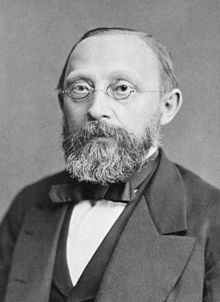Rudolf Virchow
German doctor, anthropologist, public health activist, pathologist, prehistorian, biologist and politician (1821-1902)
Rudolf Ludwig Karl Virchow (October 13, 1821 – September 5, 1902) was a German doctor, anthropologist, public health activist, pathologist, prehistorian, biologist and politician.

Quotes
edit- For if medicine is really to accomplish its great task, it must intervene in political and social life. It must point out the hindrances that impede the normal social functioning of vital processes, and effect their removal.
- 1849 (quoted in Pathologies of Power, by Paul Farmer, page 323).
- Medical statistics will be our standard of measurement: we will weigh life for life and see where the dead lie thicker, among the workers or among the privileged.
- 1848 (quoted in Infections and Inequalities by Paul Farmer, page 1.
- Omnis cellula e cellula
- All cells come from cells.
- Quoted as early as 1850
- Liebt man sich wirklich, so ist es ja nicht schwer, die Toleranz zu üben, denn die Toleranz ist die Tochter der Liebe -- es ist die eigentlich christliche Eigenschaft, die freilich von der heutigen Christenwelt nicht geübt wird.
- If there is real love, it is not difficult to exercise tolerance, for tolerance is the daughter of love -- it is the truly Christian trait, which, of course, Christians of today do not practice.
- in a letter to his father dated 7 April 1851, published in Briefe an seite Eltern, 1839 bis 1864 (1907).
- Between animal and human medicine, there is no dividing line—nor should there be.
- 1856 (Quoted in: Klauder JV: Interrelations of human and veterinary medicine. N Engl J Med 1958, 258:170-177).
- Cellular pathology is not an end if one cannot see any alteration in the cell. Chemistry brings the clarification of living processes nearer than does anatomy. Each anatomical change must have been preceded by a chemical one.
- attributed to Rudolph Virchow Coper, H., Herken, H., 1963. Dtsch. Med. Wochenschr. 88,2025– 2036. cited by 1. Gelman BB, Soukup VM, Schuenke KW, Keherly MJ, Holzer C, Richey FJ, et al. Acquired neuronal channelopathies in HIV-associated dementia. J Neuroimmunol. 2004;157(1–2 SPEC. ISS.):111–9.
- The task of science is to stake out the limits of the knowable, and to center consciousness within them.
- 1849 (R. Virchow. Der Mensch (On Man). Berlin, 1849. English translation in: L. J. Rather, Disease, Life and Man -- Selected Essays of Rudolf Virchow, Stanford University Press, Stanford, CA, pp. 67–70, 1958).
- The future is with the vegetarians.
- Quoted in Consuming Culture in the Long Nineteenth Century: Narratives of Consumption, 1700-1900, edited by Tamara S. Wagner and Narin Hassan (Lexington Books, 2007), p. 19.
- Mass disease means society is out of joint.
- 1848 Report on the typhus epidemic in Upper Silesia. Quoted in: Rudolf Virchow: Collected Essays on Public Health and Epidemiology, edited by Rather LJ. Vol 1. Canton, Mass: Science History Publications; 1985:311
Quotes about Virchow
edit- Pathology is the study of structural and functional abnormalities that are expressed as diseases of organs and systems. Classic theories attributed disease to imbalances or noxious effects of humors on specific organs. In the 19th century, Rudolf Virchow, often referred to as the father of modern pathology, proposed that injury to the smallest living unit of the body, the cell, is the basis of all disease. To this day, clinical and experimental pathology remain rooted in this concept.
- David S. Strayer and Emanuel Rubin, "Cell Adaptation, Cell Injury and Cell Death", in Raphael Rubin, David S. Strayer and Emanuel Rubin (ed.), Rubin's Pathology: Clinicopathologic Foundations of Medicine (6th ed.)